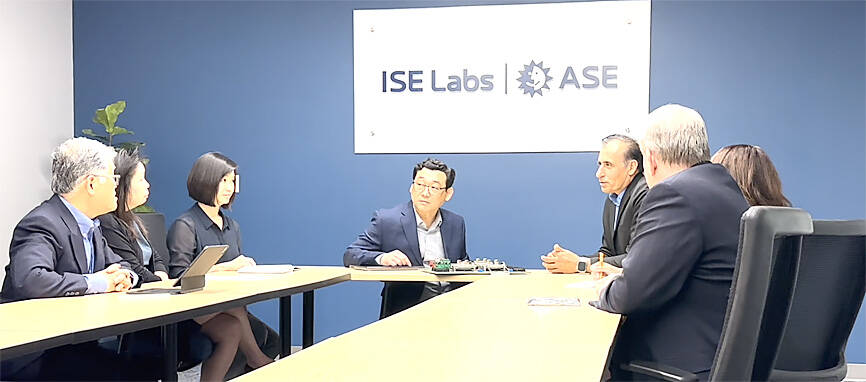ASE Technology Holding Co (ASE, 日月光投控) yesterday launched its second testing facility in San Jose, California, to expand advanced chip testing capacity such as burn-in testing to satisfy customers’ rising engineering needs for emerging semiconductor applications, such as artificial intelligence (AI) and high-performance computing (HPC).
ISE Labs Inc, a fully owned subsidiary of ASE, would operate the advanced testing facility.
When added to its first facility in nearby Fremont, ISE would double its available research-and-development lab and business space to 150,000m2 in hopes of boosting the US semiconductor supply chain, the company said in a statement.

Photo courtesy of ASE Technology Holding Co
“As the semiconductor manufacturing supply chain reshoring continues to escalate, demand for our proven engineering expertise is growing in parallel,” ISE Labs chief executive officer Kenneth Hsiang (項世傑) said in the statement.
“Expanding our operations by adding a second facility is vital to support our growing customers, who are onsite daily due to the collaborative nature of our work,” Hsiang said. “Ease of access in the South [San Francisco] Bay was a key consideration in selecting our new site.”
Numerous customers are working on solutions for AI, machine learning, advanced driver assistance systems and HPC, the statement said.
ISE Labs has spent about US$500 million in the company's US labs and hired more than 200 local employees, company president Jui Ko said. The company expected to invest about US$200 million in the San Jose facility over time in accordance with customers' demand, Ko said.
The San Jose facility would primarily house qualification and reliability processes, including environmental, mechanical, electrostatic discharge, failure analysis, and chip burn-in testing, the statement said.
ISE Labs’ high-power burn-in solutions — vital to detecting early failures in a semiconductor device — are among the best and highest-performing in the industry, it said.
The Fremont site would expand its already robust set of test functions, including automated test equipment program development, test hardware design, device characterization, wafer probing, engineering, pre-production and final testing, and system-level testing, it said.
ASE in April increased its capital spending for the second time, boosting its budget by 10 percent from an earlier estimate of US$2.1 billion to cope with growing demand.
As part of the budget adjustments, the Kaohsiung-based company also planned to allocate a bigger slice of the budget, about 24 percent, for chip testing business from an original estimate of 18 percent to get more non-turnkey solutions business.
ASE is also scouting potential sites to deploy advanced chip packaging capacity in the US, Japan and Mexico, in response to rising demand for improved supply chain resilience amid mounting geopolitical risks, the company said last month.

Intel Corp chief executive officer Lip-Bu Tan (陳立武) is expected to meet with Taiwanese suppliers next month in conjunction with the opening of the Computex Taipei trade show, supply chain sources said on Monday. The visit, the first for Tan to Taiwan since assuming his new post last month, would be aimed at enhancing Intel’s ties with suppliers in Taiwan as he attempts to help turn around the struggling US chipmaker, the sources said. Tan is to hold a banquet to celebrate Intel’s 40-year presence in Taiwan before Computex opens on May 20 and invite dozens of Taiwanese suppliers to exchange views

Application-specific integrated circuit designer Faraday Technology Corp (智原) yesterday said that although revenue this quarter would decline 30 percent from last quarter, it retained its full-year forecast of revenue growth of 100 percent. The company attributed the quarterly drop to a slowdown in customers’ production of chips using Faraday’s advanced packaging technology. The company is still confident about its revenue growth this year, given its strong “design-win” — or the projects it won to help customers design their chips, Faraday president Steve Wang (王國雍) told an online earnings conference. “The design-win this year is better than we expected. We believe we will win

Chizuko Kimura has become the first female sushi chef in the world to win a Michelin star, fulfilling a promise she made to her dying husband to continue his legacy. The 54-year-old Japanese chef regained the Michelin star her late husband, Shunei Kimura, won three years ago for their Sushi Shunei restaurant in Paris. For Shunei Kimura, the star was a dream come true. However, the joy was short-lived. He died from cancer just three months later in June 2022. He was 65. The following year, the restaurant in the heart of Montmartre lost its star rating. Chizuko Kimura insisted that the new star is still down

While China’s leaders use their economic and political might to fight US President Donald Trump’s trade war “to the end,” its army of social media soldiers are embarking on a more humorous campaign online. Trump’s tariff blitz has seen Washington and Beijing impose eye-watering duties on imports from the other, fanning a standoff between the economic superpowers that has sparked global recession fears and sent markets into a tailspin. Trump says his policy is a response to years of being “ripped off” by other countries and aims to bring manufacturing to the US, forcing companies to employ US workers. However, China’s online warriors